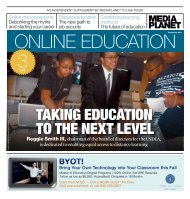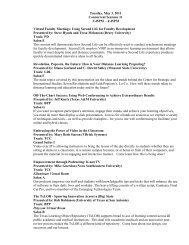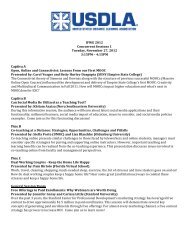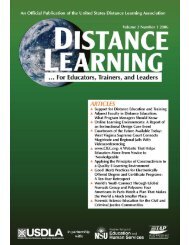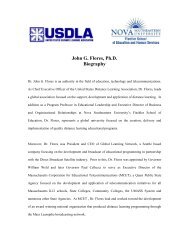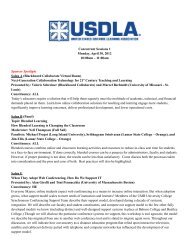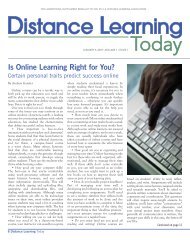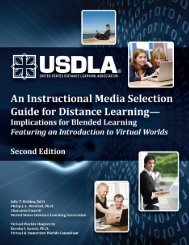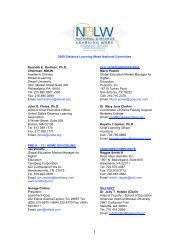United States Distance Learning Association
United States Distance Learning Association
United States Distance Learning Association
- No tags were found...
You also want an ePaper? Increase the reach of your titles
YUMPU automatically turns print PDFs into web optimized ePapers that Google loves.
Educational experiences can be categorized<br />
within a four-part framework known<br />
as Coldeway’s Quadrants. According to<br />
Coldeway, the purest form of distance<br />
education is asynchronous, in which learners<br />
can access instruction at times and<br />
places convenient to the learner (Simonson,<br />
Smaldino, Albright, & Zvacek, 2006)<br />
This work will explore experiences with<br />
asynchronous online programs offered at<br />
Thomas Edison State College.<br />
BACKGROUND<br />
According to Joe Guzzardo, TESC Director<br />
of Communications, a Carnegie Commission<br />
study in the late 1960s indicated that<br />
the state of New Jersey needed to develop<br />
educational resources for diverse groups of<br />
people not served by the established educational<br />
system. One significant group that<br />
report identified as underserved by the<br />
existing colleges were nontraditional adult<br />
students. Based in part on that Carnegie<br />
study, Thomas Edison State College was<br />
founded in 1972. From its inception, TESC<br />
was designed primarily to serve one group<br />
of people: adult learners.<br />
TESC is unique. Never envisioned as a<br />
bricks-and-mortar institution, around a<br />
specific geographic region, or a specific<br />
academic discipline per se, it was developed<br />
around a particular type of student.<br />
Thomas Edison is a public college designed<br />
for adults in New Jersey, and is one of the<br />
oldest institutions dedicated exclusively to<br />
adults in the <strong>United</strong> <strong>States</strong>. The college is<br />
recognized as a national center of excellence<br />
in the area of adult education and in<br />
the area of assessing college-level learning<br />
that has been acquired outside of the classroom.<br />
Regionally accredited by the Middle<br />
<strong>States</strong> <strong>Association</strong> of Colleges and Schools,<br />
Thomas Edison students are assured a<br />
high standard of quality. The college today<br />
has around 13,000 students; around half of<br />
those students are New Jersey residents,<br />
while the remainder are from all 50 states<br />
and over 70 countries. Additionally, a very<br />
large number of active military personnel<br />
are pursuing their degrees at Thomas Edison<br />
State College. TESC is one of the largest<br />
providers of higher education<br />
programs to the U.S. military (2007).<br />
FLEXIBILITY A KEY INGREDIENT<br />
The core of programs offered at Thomas<br />
Edison State College revolves around<br />
when and where an adult student can<br />
learn, unlike traditional colleges that have<br />
programs that revolve around a specific<br />
place and time that may or may not take<br />
into account the needs of the adult. (J.<br />
Guzzardo, personal communication,<br />
March 29, 2007)<br />
TESC uses Blackboard as its course management<br />
system. Additionally, the TESC<br />
MIS department has developed an online<br />
portal called MyEdison, a very easy-tonavigate<br />
system through which all students<br />
and even applicants enter the college.<br />
The MyEdison portal becomes the de<br />
facto place where students go to class and<br />
earn their degree—where they register for<br />
courses, pay tuition, check grades, view<br />
degree audits, get in touch with mentors,<br />
e-mail other students. All aspects of going<br />
to college can be managed through the<br />
MyEdison/Blackboard portal.<br />
Online classes at Thomas Edison are on<br />
a 12- to 16-week asynchronous timeline.<br />
Students generally log on when it is convenient<br />
for them to post their responses to<br />
readings and to post assignments for<br />
review by faculty members—or mentors,<br />
as they are called at TESC—who supervise<br />
all courses whether they are online or<br />
guided study. Taking an active role in<br />
course discussions is required, unlike in<br />
traditional face-to-face courses that might<br />
enable the student to sit quietly and not<br />
contribute to classroom discussion. Students<br />
do not receive credit for just attending<br />
class as might occur in face-to-face<br />
instruction. Every student must participate<br />
actively in discussions; individuals cannot<br />
58 <strong>Distance</strong> <strong>Learning</strong> Volume 4, Issue 4



